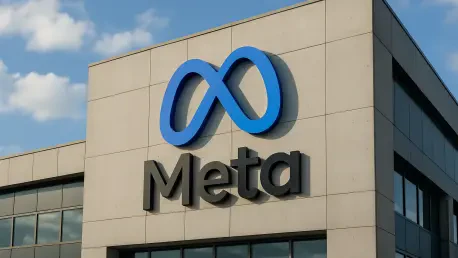In a rapidly evolving tech landscape, Meta, the social media titan once at the forefront of artificial intelligence innovation, finds itself navigating turbulent waters as it seeks to reclaim its position among industry leaders. Reports of early-stage discussions with a major competitor to bolster its AI capabilities have sparked intrigue and raised questions about the future of its ad targeting prowess. This potential collaboration signifies a pivotal moment for a company that has historically shaped the digital advertising space but now faces stiff competition in cutting-edge technology. As Meta grapples with internal setbacks and a shifting competitive dynamic, the stakes couldn’t be higher for its core revenue streams, which heavily rely on precise and effective ad delivery systems. This situation offers a unique lens into how even the biggest players must adapt and sometimes turn to unexpected allies to maintain relevance in an ever-changing field.
Exploring Strategic Alliances in AI
Potential Collaboration with a Tech Giant
The tech industry is abuzz with news of Meta engaging in preliminary talks with a prominent rival to leverage advanced AI models for enhancing its advertising precision. This move, though not yet finalized, underscores a strategic shift for Meta as it aims to refine its ad targeting capabilities using external resources. Such a partnership could provide access to sophisticated models that, when combined with Meta’s vast repository of user data, might significantly improve the effectiveness of its advertising algorithms. This is particularly crucial at a time when personalized ads remain a cornerstone of Meta’s revenue model. However, aligning with a direct competitor in the online ad market introduces a layer of complexity, as it requires navigating shared interests and potential conflicts. The discussions reflect a pragmatic approach, prioritizing immediate business needs over long-standing rivalries, and signal Meta’s recognition of the need for external support to stay competitive in a critical area of its operations.
Expanding Partnerships Beyond Traditional Boundaries
Beyond this high-profile potential alliance, Meta has been actively seeking other collaborations to address gaps in its AI expertise. Ties with various innovative firms for chatbot enhancements and image generation capabilities highlight a broader strategy of diversifying technological inputs. For instance, partnerships aimed at integrating advanced AI video features show Meta’s intent to enrich user engagement across its platforms. These alliances suggest that internal development alone may not suffice to keep pace with rapid advancements in the field. By tapping into external expertise, Meta can quickly adopt cutting-edge solutions that enhance its offerings, even as it works to rebuild its in-house capabilities. This trend of outsourcing innovation, while effective in the short term, raises questions about the long-term sustainability of relying on third-party providers for core technological advancements. It paints a picture of a company in transition, balancing immediate improvements with the need for independent progress.
Meta’s Challenges and Efforts to Rebuild AI Leadership
Historical Strengths and Recent Setbacks
Meta’s journey in AI began with a position of strength, marked by the establishment of a pioneering research lab over a decade ago under the guidance of a renowned expert. This initiative embedded AI deeply into essential functions like content moderation and personalization, setting industry benchmarks. The development of widely adopted open-source tools further cemented Meta’s early dominance in the space. However, recent years have seen this lead erode, with the underwhelming performance of newer generative AI models allowing competitors, including international players, to surpass Meta’s offerings. This decline has been a significant blow, as AI remains integral to maintaining user engagement and optimizing ad delivery. The shift from a leader to a contender in this arena underscores the challenges of sustaining innovation amidst fierce global competition. Meta’s historical achievements now stand in contrast to its current struggles, highlighting the urgency of addressing these technological shortcomings.
Aggressive Investments in Talent and Infrastructure
In response to these challenges, Meta has embarked on an aggressive campaign to revitalize its AI division through substantial investments in talent and strategic acquisitions. High-profile hires, with compensation packages reaching extraordinary figures, demonstrate a commitment to attracting top researchers from rival organizations. Additionally, the appointment of a new chief AI officer, to whom even long-standing experts report, signals a structural overhaul aimed at refocusing the company’s technological direction. Investments in stakes of promising AI firms further illustrate Meta’s intent to rebuild its competitive edge through both human capital and external resources. While these efforts are promising, tangible results remain elusive, as the integration of new talent and leadership takes time to translate into innovation. The scale of these moves reflects an acknowledgment of past missteps and a determination to close the gap with competitors, though the path to reclaiming a leading position appears long and complex.
Navigating a Path Forward with Strategic Balance
Reflecting on Meta’s recent maneuvers, it becomes clear that the company has prioritized immediate operational gains over standalone innovation by forging ties with external tech entities. These partnerships, while bolstering ad targeting and user interaction in the short term, also expose a reliance on outside expertise that once was a hallmark of Meta’s internal strength. Looking ahead, a critical step for Meta involves striking a balance between leveraging these collaborations and accelerating in-house development to reduce dependency. Investing in long-term research initiatives alongside nurturing newly acquired talent could pave the way for sustainable progress. Furthermore, fostering an environment of innovation within its teams might help Meta anticipate rather than react to industry trends. As the tech landscape continues to evolve, Meta’s ability to adapt strategically while rebuilding its foundational AI capabilities will likely determine whether it can once again lead rather than follow in this vital domain.









